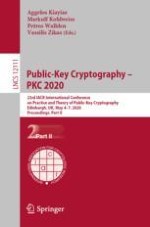2020 | OriginalPaper | Buchkapitel
Mon\(\mathbb {Z}_{2^{k}}\)a: Fast Maliciously Secure Two Party Computation on \(\mathbb {Z}_{2^{k}}\)
verfasst von : Dario Catalano, Mario Di Raimondo, Dario Fiore, Irene Giacomelli
Erschienen in: Public-Key Cryptography – PKC 2020
Aktivieren Sie unsere intelligente Suche, um passende Fachinhalte oder Patente zu finden.
Wählen Sie Textabschnitte aus um mit Künstlicher Intelligenz passenden Patente zu finden. powered by
Markieren Sie Textabschnitte, um KI-gestützt weitere passende Inhalte zu finden. powered by
